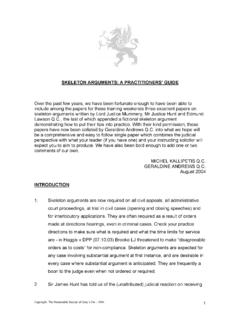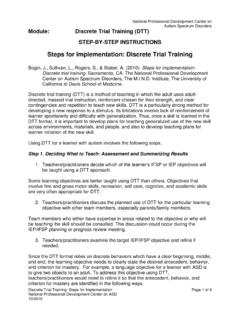Transcription of Building Skills for Self-Employment: Basic Training …
1 Chapter Title 12 FIELD Best Practice guide : VOLUME 2 Building Skills for self - employment : Basic Training forMicroentrepreneursThese materials are partially funded by a grant from the SmallBusiness Administration. SBA s funding is not an endorsement of anyproducts, opinions or services. All SBA-funded programs are extended tothe public on a non-discriminatory support is provided by the Charles Stewart Mott 2002 by FIELD, Microenterprise Fund forInnovation, Effectiveness, Learning and DisseminationPublished in the United States of America2002 by the Aspen InstituteAll rights reservedPrinted in the United States of America ISBN: 0-89843-364-9 Building Skills for self - employment : Basic Training forMicroentrepreneursFIELD Best Practice guide .
2 VOLUME 2 Candace NelsonAugust 2002 FIELD (Microenterprise Fund for Innovation, Effectiveness, Learning and Dissemination)The Aspen InstituteOne Dupont Circle, NWSuite 700 Washington, DC 20036(202) writingBuilding Skills for self - employment : Basic Training for microentrepreneurs , I learnedagain that the goal of preparing people for successful self - employment is a complex andchallenging one. Despite significant variation in mission, target group and services, the overallstrategy for most programs almost always includes Training . Yet, core business Skills trainingcomes in many forms. My challenge has been to understand the reasoning behind each variant,on the one hand, and identify recommended practice, on the other.
3 The former led me to presentmuch of this rich variation in order to capture the reality in the field; the latter forced me tochoose, from many good practices, those I wanted to recommend to organizations seeking toimprove their Training or just starting to think about their Training design. The paper includesboth, with the hope that readers will find, among the multitude of experiences described here,something that will guide or inspire them in their want to thank a number of respected practitioners whose insights, experience and guidancewere invaluable to me throughout the research process. Special thanks are extended to AgnesNoonan (WESST Corp), Eloise Vitelli (Maine Centers for Women, Work and Community), GregWalker-Wilson (Mountain Microenterprise Fund), Nancy Swift (Jefferson EconomicDevelopment Institute) and Chris Giallongo, consultant and trainer for Jefferson EconomicDevelopment Institute, who together served as my advisory panel.
4 They helped me identify keyissues for research, offered insights from their experiences to shed light on these issues, referredme to many other related resources, and reviewed drafts of this staff of Northeast Entrepreneur Fund (Virginia, Minn.) and the Women s Initiative for SelfEmployment (San Francisco, Calif.) graciously hosted site visits for me, coordinating staffinterviews, observation and focus groups with clients. Numerous other organizationsparticipated in lengthy telephone interviews; I am grateful to staff of Good Work, NeighborhoodDevelopment Center, West Co., Hull House, MicroCredit New Hampshire, Rhode IslandMicroenterprise Association and the Oregon Enterprise Network for the time devoted to theseinterviews.
5 I owe special thanks to two trainers Joye Norris and Theresia Paauwe whogenerously shared their passion for adult education and their original concept for this guide was conceived by Elaine Edgcomb, director of FIELD. I thankher for thoughtful input and assistance throughout the process of research and writing. Thanksalso to FIELD consultants Joyce Klein and Amy Kays Blair who are authoring other modules inthis series and whose recommendations have also helped to improve this one, and to othermembers of the FIELD team, including Erika Malm, Carol Rugg, Colleen Cunningham, JackieOrwick, Greg Landrigan, Britton Walker and Sabrina Hardy who have helped bring theseproducts to life in the form seen , I thank both funders of this program, the Small Business Administration s Programfor Investment in microentrepreneurs (PRIME)
6 And the Charles Stewart Mott Foundation, andtheir program officers, Jody Raskind and Jack Litzenberg, who have demonstrated strongconfidence in this NelsonConsultantFIELDT able of ContentsPROJECTOVERVIEW6 INTRODUCTION7 ASSESSMENTTOOL9 MARKET-ORIENTEDTRAININGDESIGN11 Orientation and Exposure to Business 12 Socio-Economic Characteristics that Influence the Training Product13 THECONTENT OFTRAINING19 Key Skills and Tips for Teaching Them 20 The Business Plan: Process and Product25 Clients Readiness to Start a Business27 TRAININGDELIVERY33 Format and Length of Core Training : How Much Is Enough?33 Training Approach36 Trainers: Qualifications and Staff Development43 Cost Recovery46 MONITORING ANDEVALUATINGCORETRAINING47 CONCLUSION51 TOOLS52 Job Announcement, Small Business Trainer, Women s Initiative forSelf EmploymentResources for Basic Skills Training in MicroenterpriseAgenda for Two-day Train-the-Trainer Workshop, Business Matters Training Resources, Session Designs How Sweet Is It?
7 REAL Enterprises, Inc. Cathy s Cleaning Crew, self - employment : From Dream to Reality, Linda Gilkerson and Theresia Paauwe Daycare Auction Game, Business Matters Training Resources, Inc. Finding Your Business Idea, Candace Nelson and Chris GiallongoBIBLIOGRAPHY93 Project OverviewThe impetus for this project grew out of years of extensive research by FIELD, theMicroenterprise Fund for Innovation, Effectiveness, Learning and Dissemination, into thetypes of Training and technical assistance provided by microenterprise programs across theUnited States. FIELD s research revealed that although more than 90 percent of allmicroenterprise programs provide Training and technical assistance, there are few resourcesavailable to help implementers improve their services and/or assess their efforts against best-practice project aims to address that need.
8 Using grant support from the Small BusinessAdministration and the Charles Stewart Mott Foundation, FIELD has created this series of bestpractices Training modules designed to help microenterprise programs deliver more effectivetraining and technical assistance to low-income modules are based on lessons learned from FIELD s past work, as well as from inputobtained from leading practitioners, who served as advisors. As funding becomes available,additional guides will be developed. Topics for the first four modules in the series are:FIELD Best Practice guide : Volume 1 Entering the Relationship: Finding and Assessing Microenterprise Training Clientsexplores howprogram practitioners can conduct market research, develop effective marketing strategies, andappropriately screen and assess incoming Best Practice guide : Volume 2 Building Skills for self - employment : Basic Training for Microentrepreneursoffers best practices in coretraining and their implications for improving Training Best Practice guide : Volume 3 Training for Microenterprise Development.
9 A guide to Curriculaidentifies the characteristics of aneffective business-planning curriculum for low-income clients and reviews a set of productscurrently being marketed to Best Practice guide : Volume 4 Keeping It Personalized: Consulting, Coaching & Mentoring for microentrepreneurs provides a summaryof findings from research in business consulting, coaching and mentoring with case-studyexamples of best practices in all three types of technical assistance targeted to low-income Skills for self - employment : Basic Training for microentrepreneurs IntroductionAstrong majority of existing and potential entrepreneurs who approach microenterprisedevelopment programs in the United States are looking for information, inspiration, adviceand support before, or instead of, loans or other financial services.
10 Some know exactly what theyneed; others are taking the first step down a long road of exploration and self rely on Training to respond to both extremes and the many points in-between. Trainingofferings have grown in length, number and diversity. In addition, an array of publishedcurricula specifically for microenterprise is now available to the public. Helping those who haveoperated outside of the mainstream of business and economic opportunity to meet the non-financial challenges to successful entrepreneurship including gaining knowledge, planning, Building support networks and finding the confidence to take the risks inherent in self - employment has become the mission of many microenteprise have carried out this mission through different combinations of Training and technicalassistance.






